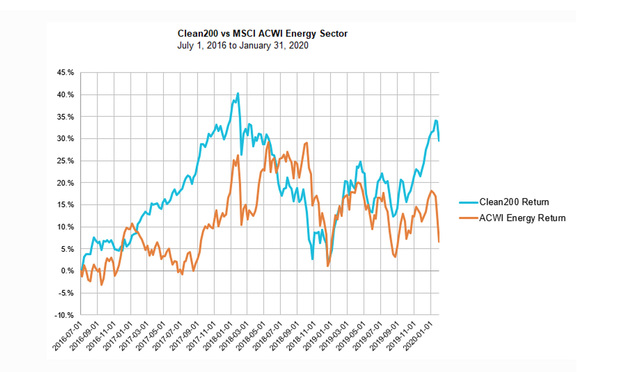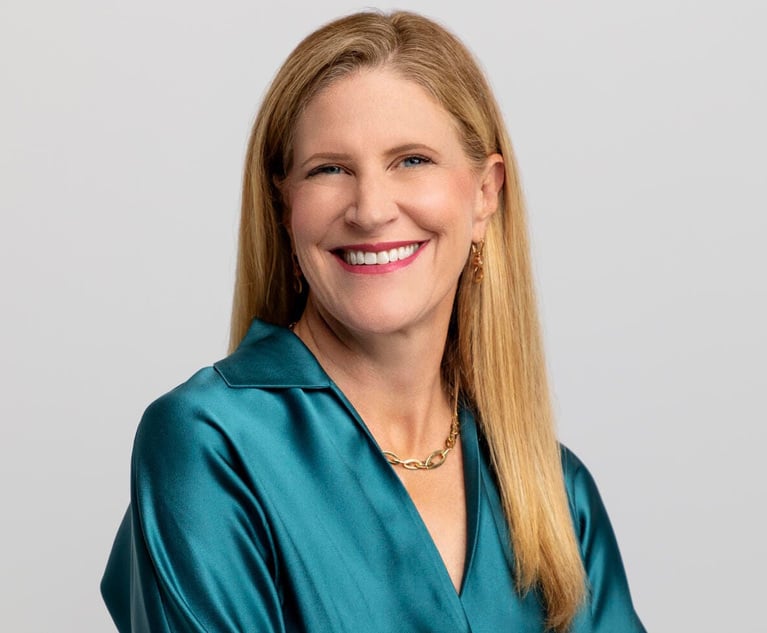Alphabet, HP, Cisco and Tesla in Top 10 of 'Cleanest' Global Companies
The Carbon Clean 200 ranks publicly traded companies that are leading the way on clean energy issues in the first quarter of 2020 and offers several key takeaways for general counsel and their companies.
February 13, 2020 at 04:56 PM
4 minute read
 Photo: D-Krab/Shutterstock.com
Photo: D-Krab/Shutterstock.com
Of the top carbon clean companies in a new report, Taiwan Semiconductor Manufacturing Co. Ltd. ranked first while four U.S. firms—Alphabet Inc., HP Inc., Cisco Systems Inc. and Tesla Inc.—rated in the top 10.
The report, Carbon Clean 200, ranks publicly traded companies that are leading the way on clean energy issues in the first quarter of 2020. It offers several key takeaways for general counsel and their companies, including that the cleanest 200 corporations financially outperformed 100 of the largest oil, gas and coal companies over the past three years.
In fact, the Clean 200 has outperformed the MSCI ACWI Global Energy Index, an energy index for the largest oil, gas and coal companies, by a factor of four, 29.6% to 6.7% since the first Clean 200 report in July 2016.
The report was prepared by As you Sow, a nonprofit group advocating corporate accountability on environmental and other issues; and by Corporate Knights, a Toronto-based for-profit media and research company that focuses "clean capitalism."
Toby Heaps, CEO of Corporate Knights and co-author of the report, said, "Investors are starting to really wake up to this new narrative—that the fossil fuel industry growth story is coming to an end." Heaps spoke during a webcast introducing the report Thursday.
"Big money is waking up to this and investing in green investments," Heaps added. "Smart money is now going big on clean energy."
Andrew Behar, CEO of As You Sow and co-author of the report, said, "In 2016 people were saying, 'If we divest fossil fuels, there is nothing to invest in.' We created the Clean 200 to show investors around the world" that there are profitable investments to be made for a clean energy future.
Heaps added, "Given that oil prices rose by 30% in the past year, it is surprising that oil company stocks have performed so poorly," suggesting that investors are breaking up with fossil fuels.

The report and webcast showed that Europe had 69 companies on the list, followed by the U.S. with 39, Japan with 28 and China with 27.
Besides the Taiwan and U.S. companies in the top 10, the report also ranked Siemens AG of Germany at No. 3, Toyota Motor Corp. of Japan at No. 4, Iberdrola SA of Spain at No. 6, Schneider Electric of France at No. 9, and Unilever of the U.K. and The Netherlands at No. 10.
Of the companies on the 200 list, the most were in the industrial sector at 79, followed by 44 in information technology, and 26 in materials, a category that includes recycled metals and paper.
Heaps explained that the Clean 200 consists of companies with more than $1 billion in revenue and more than 10% clean energy revenues. He said 59 companies that met such criteria were excluded from the list, however, after being screened on other key factors that included social responsibility, corporate governance and sustainable sourcing.
Companies were dropped, for example, if they paid fines, penalties or settlements in excess of 1% of their revenues; if they were found to have human rights violations; or if they used forced child labor in their supply chains.
Some companies were excluded just based on the products they make or sell: tobacco, weapons, natural gas and nuclear energy, for instance. Neither natural gas nor nuclear energy are considered "clean" energy, explained research manager Wendy Shen-Juarez of Corporate Knights.
Shen-Juarez said her company developed the clean revenue metric three years ago as a synthesis of revenue, best practices and several other sources. Where possible, the researchers consult with the companies themselves, she added.
The report concludes, "The fundamental story is that the march from high carbon energy to clean energy is only quickening driven mainly by economics, risk, and increasingly supported by other social forces from Greta [Thunberg, climate advocate] to Pope Francis; from Extinction Rebellion to The European Central Bank."
This content has been archived. It is available through our partners, LexisNexis® and Bloomberg Law.
To view this content, please continue to their sites.
Not a Lexis Subscriber?
Subscribe Now
Not a Bloomberg Law Subscriber?
Subscribe Now
NOT FOR REPRINT
© 2025 ALM Global, LLC, All Rights Reserved. Request academic re-use from www.copyright.com. All other uses, submit a request to [email protected]. For more information visit Asset & Logo Licensing.
You Might Like
View All
John Deere Annual Meeting Offers Peek Into DEI Strife That Looms for Companies Nationwide
7 minute read
Wells Fargo and Bank of America Agree to Pay Combined $60 Million to Settle SEC Probe

Former Capital One Deputy GC Takes Legal Reins of AIG Spinoff

Ex-Six Flags CLO Lands New C-Suite Post—This Time as HR Chief
Trending Stories
- 1Hogan Lovells Hires White & Case Corporate and Finance Team in Italy
- 2New York District Attorneys Endorse Governor's Proposed Rollback of Discovery Reforms
- 3Greenberg Traurig Launches Munich Office with Eight Hires, Including McDermott Group
- 4Midlevel Appellate Court Reinstates New York's Voting Rights Act
- 5Consumer Protection Suit Cleared to Go Forward Against Irritating Eye Serum
Who Got The Work
J. Brugh Lower of Gibbons has entered an appearance for industrial equipment supplier Devco Corporation in a pending trademark infringement lawsuit. The suit, accusing the defendant of selling knock-off Graco products, was filed Dec. 18 in New Jersey District Court by Rivkin Radler on behalf of Graco Inc. and Graco Minnesota. The case, assigned to U.S. District Judge Zahid N. Quraishi, is 3:24-cv-11294, Graco Inc. et al v. Devco Corporation.
Who Got The Work
Rebecca Maller-Stein and Kent A. Yalowitz of Arnold & Porter Kaye Scholer have entered their appearances for Hanaco Venture Capital and its executives, Lior Prosor and David Frankel, in a pending securities lawsuit. The action, filed on Dec. 24 in New York Southern District Court by Zell, Aron & Co. on behalf of Goldeneye Advisors, accuses the defendants of negligently and fraudulently managing the plaintiff's $1 million investment. The case, assigned to U.S. District Judge Vernon S. Broderick, is 1:24-cv-09918, Goldeneye Advisors, LLC v. Hanaco Venture Capital, Ltd. et al.
Who Got The Work
Attorneys from A&O Shearman has stepped in as defense counsel for Toronto-Dominion Bank and other defendants in a pending securities class action. The suit, filed Dec. 11 in New York Southern District Court by Bleichmar Fonti & Auld, accuses the defendants of concealing the bank's 'pervasive' deficiencies in regards to its compliance with the Bank Secrecy Act and the quality of its anti-money laundering controls. The case, assigned to U.S. District Judge Arun Subramanian, is 1:24-cv-09445, Gonzalez v. The Toronto-Dominion Bank et al.
Who Got The Work
Crown Castle International, a Pennsylvania company providing shared communications infrastructure, has turned to Luke D. Wolf of Gordon Rees Scully Mansukhani to fend off a pending breach-of-contract lawsuit. The court action, filed Nov. 25 in Michigan Eastern District Court by Hooper Hathaway PC on behalf of The Town Residences LLC, accuses Crown Castle of failing to transfer approximately $30,000 in utility payments from T-Mobile in breach of a roof-top lease and assignment agreement. The case, assigned to U.S. District Judge Susan K. Declercq, is 2:24-cv-13131, The Town Residences LLC v. T-Mobile US, Inc. et al.
Who Got The Work
Wilfred P. Coronato and Daniel M. Schwartz of McCarter & English have stepped in as defense counsel to Electrolux Home Products Inc. in a pending product liability lawsuit. The court action, filed Nov. 26 in New York Eastern District Court by Poulos Lopiccolo PC and Nagel Rice LLP on behalf of David Stern, alleges that the defendant's refrigerators’ drawers and shelving repeatedly break and fall apart within months after purchase. The case, assigned to U.S. District Judge Joan M. Azrack, is 2:24-cv-08204, Stern v. Electrolux Home Products, Inc.
Featured Firms
Law Offices of Gary Martin Hays & Associates, P.C.
(470) 294-1674
Law Offices of Mark E. Salomone
(857) 444-6468
Smith & Hassler
(713) 739-1250






